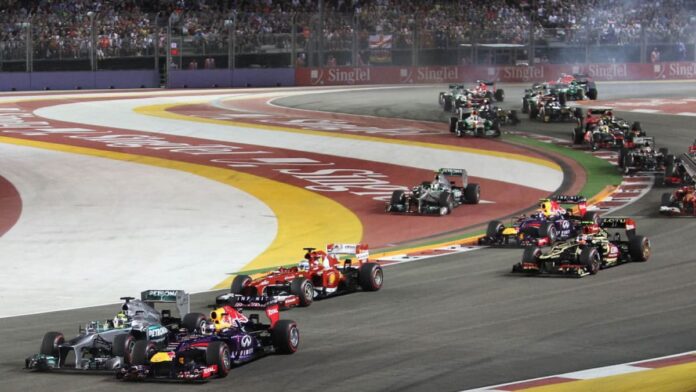Could Singapore afford to ink the deal a year later, when the pandemic situation might be more stable?
Mr Raphael Reich, managing director of sports consultancy Dejavu Consulting, said a growing number of countries want to be included on the F1 race calendar as COVID-19 restrictions ease across the world.
“Securing a seven-year contract is an unprecedented move (for Singapore), but it is also a smart move to lock it in, because there is no guarantee that Singapore will be able to do it later on when more and more countries also want to hold a Grand Prix,” said Mr Reich.
When Singapore first held a GP in 2008, he noted the cacophony from commentators who had questioned the Republic’s desire to host a race. These voices have slowly faded away as people realise there are tangible economic benefits from tourism, especially now when the sector desperately needs a boost, said Mr Reich.
F1 is watched by more than 930 million viewers around the world, most of whom track the championship on broadcast television.
“The race helps put Singapore on the map, such that when you go to another country and talk to people, there is a good chance they may recognise Singapore from its skyline along Marina Bay,” said the Swiss consultant. “There are a lot of positive, good vibes from seeing those images on live TV during the race.”
Dr Seshan Ramaswami, Associate Professor of Marketing Education at the Singapore Management University, said that with public monies being used to support the event, one can think of hosting an F1 race as an “investment in maintaining and growing Singapore’s reputation as a global city with an exciting vibe and vibrancy”.
“The measurable short-term impact in terms of increased economic activity directly related to the event in terms of airlines, hotels, F&B and retail revenues may not by itself justify the investment. However, the argument for a potential long-term positive consequence is far more compelling,” said the marketing professor.
As a night race held against the backdrop of an impressive skyline, the Singapore GP gets television and online media coverage among a very specific demographic of financially successful, young, globally mobile decision makers from Asia and around the world, he added.
“It shows off Singapore’s organisational expertise, infrastructure, stable government and economy in a very good light,” said Dr Ramaswami.
Mr James Walton, Deloitte Singapore’s travel, hospitality and services sector leader, said the seven-year deal is essentially Singapore’s attempt to regain its place as a tourism hub for the region.
“(The F1 contract is) a step in the right direction as we try to emerge from the pandemic, and we see how sport is opening up around Europe and around the Americas, where we are seeing full stadiums… So I think it’s a bold statement, and in part, Singapore is hoping to avoid a risk of being left behind,” he said.
Even so, there is a risk that such a strategy may still backfire, said some experts. That would depend on a myriad of factors.
For one, there is still a possibility that the pandemic situation might not have improved by September and October to justify allowing tens of thousands of spectators to mingle and roam around the Marina Bay circuit per day.
Mr Walton said this could be why organisers have gone for a seven-year deal, because it would help to lower the stakes for this year’s race since there is a longer runway for Singapore race organisers to do a good job.
“One of the reasons for having a seven-year runway is that there is probably a feeling amongst the organisers that there is pent-up demand, and that there are people who want to travel to watch F1, and local fans who want to watch F1, though that may not necessarily come in the first year,” said Mr Walton.
The 2022 race could be like a “tester” event for Singapore, he said.
Escape the ordinary and discover the extraordinary! From bustling cities to serene landscapes, every journey begins with a single step—let us guide yours. Enjoy curated itineraries, hidden gems, and hassle-free bookings designed for explorers at heart. Whether it's a weekend getaway or a globe-trotting adventure, your Next unforgettable experience is just a click away.










